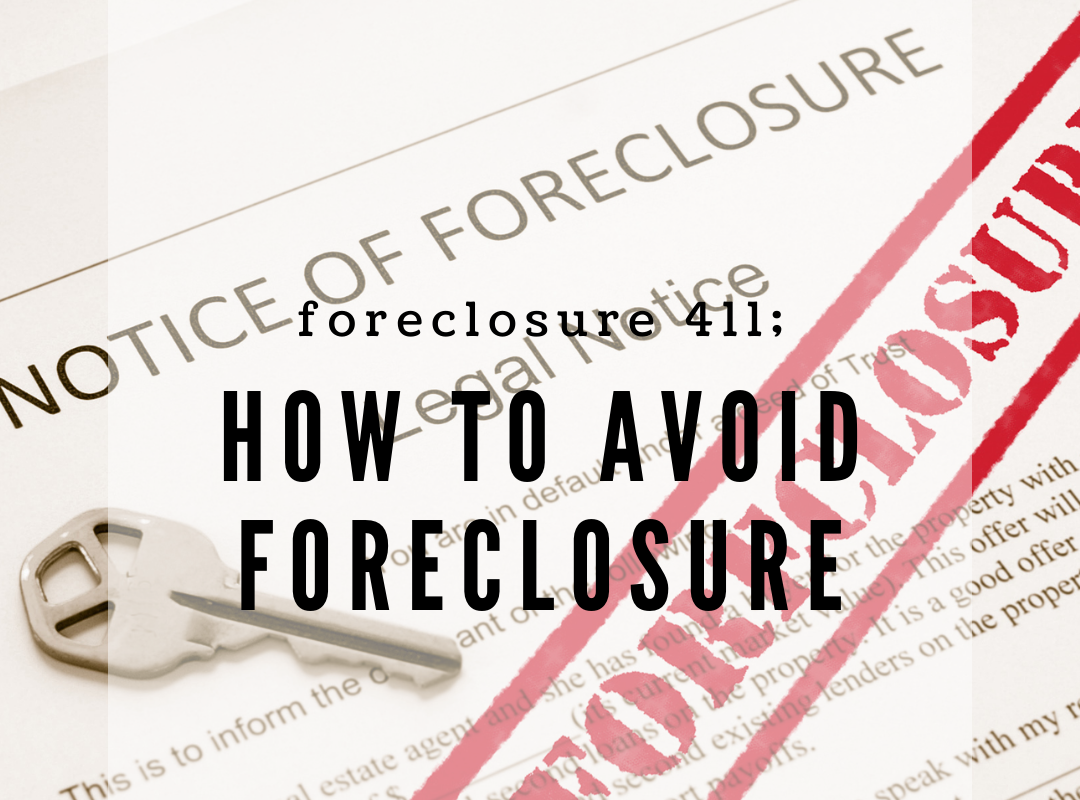There are many reasons that a homeowner may be facing foreclosure. Job loss, unexpected home repairs, unexpected illness or medical emergencies, divorce, or an increase in bills and debt payments are all events that can throw people into this unfortunate situation.
There are downsides to foreclosure for the homeowner beyond just losing the property. The foreclosure process can lead to increased stress with negative health benefits, it can take up much of your time, and it can have a real, negative impact on credit scores. This can make financing for a home in the future difficult.
But what can a homeowner that finds themselves in this unfortunate situation do? Luckily, there are options and alternatives homeowners facing foreclosure have to avoid it.

This blog post will introduce you to some of the options that may be available to you if you are facing home foreclosure.
Loan Modification

If you are behind on your mortgage payments, you may be able to go to your mortgage lender and receive a loan modification. A loan modification is similar to a refinance, but rather than paying off your mortgage and creating a new one, you are able to directly adjust the terms of your mortgage. Some terms that can be changed are the term (length of your mortgage) or the interest rates. For a loan modification, you will have to be able to provide evidence of hardship, because lenders normally consider modifications where a borrower is in financial trouble and cannot make payments under the current loan terms.
According to Fannie Mae, the benefits of a loan modification can include “resolv[ing] your delinquency status with your mortgage company”, and “reduc[ing] your monthly mortgage payments to a more affordable amount.” It can also be less damaging to your credit score.
Lenders will want to see “proof” that you will make payment on the new loan terms. This may include an updated credit check and debt-to-income analysis, as well as pay-stubs and asset statements. Individuals seeking loan modifications often seek the services of an attorney throughout the process.
Refinance
A “refinance” the process of replacing your existing mortgage with a new mortgage, typically in order to reduce monthly payments, lower the interest rate, cash out equity in your home, change mortgage companies, or shorten the term of the mortgage.
Refinancing can help prevent foreclosure by reducing your monthly payment to an amount you can afford. The advantage of refinancing is that, not only do you avoid foreclosure, but you will be able to stay in your home and continue as a property owner.
To qualify for refinancing, lenders will consider your credit score and debt-to-income ratio. These metrics help assess your creditworthiness.

Learn more about differences between a loan modification and a refinance here!
Property Sale

One straightforward way to stop the foreclosure process is to sell the property. The proceeds of the sale are then used to pay off the debt owed to the mortgage lender, including any delinquent payments. If there is equity in the home and the sale price is greater than the amount owed, owners can even walk away with cash in their pocket. Once the sale is complete and the debt is cleared, the foreclosure process will be dismissed.
Unfortunately, you will not own the property any longer, and you may need to relocate if that was the home you lived in. Selling the property, however, can protect your credit for the negative impact of foreclosure, which can increase your chances of being able to get a mortgage for a home in the future.
Selling “Subject-To”
You can sell a house with a mortgage in Connecticut to avoid foreclosure. This is often called selling “subject-to” the mortgage. According to The Balance:
“Buying subject-to means buying a home subject-to the existing mortgage. It means the seller is not paying off the existing mortgage. Instead, the buyer is taking over the payments.”
The advantage of selling subject-to is that someone else takes over making the mortgage payments and can prevent foreclosure. On top of that, you can often put more cash in your pocket because buyers that take over mortgage payments will pay more since they don’t need to secure financing. You also will get a higher pool of potential buyers – creating a bidding effect. 60 Second Home Buyers buys property subject-to – give us a call at 844-710-7355 for more information!

Short Sale
If the amount you owe on your mortgage is higher than your home is currently worth, you can still sell your home to stop the foreclosure process. To do so, you would have to go through the “short sale” process.
A real estate “short sale” is when a homeowner in financial distress, possibly facing the foreclosure process, sells the property for less than the amount due on the mortgage. This type of sale has to be approved by the bank, since they are going to be required to take less than the amount that they are owed. According to Investopedia,

“Sometimes the difference between the sale price and the mortgage amount is forgiven by the lender, but not always. For the seller, the financial consequences of a short sale are less severe than those of a foreclosure.”
-Investopedia
An “approved short sale” means the bank has signed off on the sale price. An “unapproved short sale” refers to a short sale that is pursued for a price that has not been agreed upon by the bank.
You may wonder why a bank would ever agree to a sale of the property for less than the full amount that they are owed?
There are benefits to the bank for a short sale. Allowing a short sale can save the bank costs such as attorney fees or court costs that they would incur by pursuing the foreclosure. Also, a bank is not looking to be a landlord or house flipper – owning and controlling the property is not their desire. A short sale can let them avoid having to deal with holding the property.
When the seller works with the bank towards a short sale, they are more likely to continue maintaining the property in good condition. Poor property conditions and changes in the real estate market often mean that homes are worth less than the amount owed. Foreclosing on the property is not a guarantee of getting more than the short sale price anyway.
Here are the steps of a typical short sale:
- Talk to a Professional: To begin the process, you should talk with professionals with experience in short sales. Attorneys and tax advisors can offer advice on the process, and real estate professionals can negotiate with the bank of your behalf
- List: After you have contacted the bank, they may insist that you list the property on the CT MLS exchange to make sure that you have the maximum visibility to receive the “highest and best” offer. You may also work with a real estate investor, like 60 Second Home Buyers in this process.
- Offer Submission: Once you have listed the property, you will need to submit the highest and best offer to the bank for their review and decision as part of the short sale package.
- Lender’s Review and Response: Lenders review the “short sale package”, and perform their due diligence and any required inspections. They can then either accept the short sale offer or reject it.
- Close on the Sale: Upon acceptance of the short sale offer by the lender, the required title work, such as a title search and securing title insurance, is completed and closing is arranged between the buyer and sellers’ attorneys.
Deed-In-Lieu
Deeds in lieu of foreclosure are documents that transfer title from the property owner to the lender in exchange for eliminating the mortgage deed. These deeds are executed by the property owner and recorded at the county.
Similar to the short sale, banks accept this arrangement to avoid long, costly, and drawn out foreclosure actions that result in the same outcome: a bank-owned property. Although you will have to relocate in this scenario, there are some advantages to the homeowner in this scenario – saving your credit score and avoiding the stress of foreclosure litigation.
A risk of deeds in lieu of foreclosure is losing out on money. Had you listed it on the open market, it is possible you could have sold it and put some cash in your pocket on top of what you owed.
Consider first trying to sell and using a deed in lieu of foreclosure as a last resort. Contact us for a no obligation cash offer.

